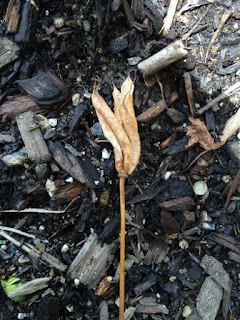This is usually when you would deadhead the spent flower in order to keep your plant blooming. But if you allow a few of these spent blooms to take their natural course, you will be rewarded with seeds!
Learning how to harvest the seeds from your plants is very exciting and rewarding.
 |
| Blooming Columbine |
.png)
I came across a Columbine, Aquilegia plant in the garden the other day which had not been deadheaded at all. It was full of dried pods full of seeds. Very exciting!
 |
| Columbine seed pod |
.png)
The pods should be crispy and brown. If they are still green and not open then the seeds are not ready yet.
.png)
Each chamber of the pod is full of many seeds! They should fall right out very easily. If the chambers are still closed, wait a week.
.png)
I collected hundreds of seeds from one plant.
I made my own seed envelopes out of post-it notes. There's a tutorial here.
If you have different types of Columbines in your yard, they will readily hybridize with the help of pollinators. The seeds you collect from one plant may not look like the parent plant when it blooms, but a mixture of different types you may have in your yard.
Columbine seeds are easy to grow directly sowed in the ground. Plant them in a shady spot in your yard for spring germination. They may not get flowers the first year but should peak out by the second.










